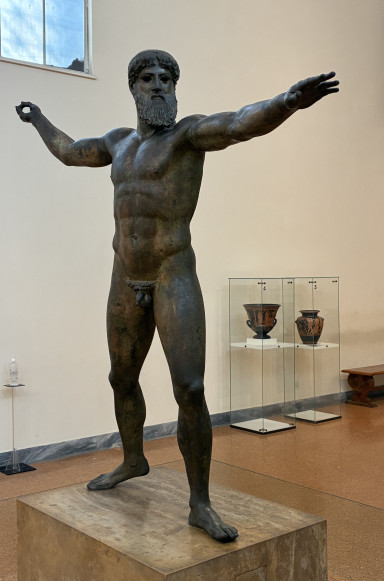

Stephan
Zilkens
,
Zilkens' News Blog 45 2025
Just over seven weeks to go until Christmas. It's a good thing that there are still a few art fairs coming up before then, where willing HNWIs (high net worth individuals) can happily spend their cash. Statistically, members of this group (i.e. those with more than USD 1 million in liquid assets, including shares) spend around USD 38,000 per year on art. This was once again revealed by an Art Market Report (usually only available in English). It would be nice if a few of them could now carry the mood from Paris and Turin over to Art Cologne. The German art trade could definitely use it.
Last week, the Swiss Insurance Association held a great conference in Bern on the topic of art insurance. Around 60 participants gathered in the beautiful rooms of the Kornfeld auction house in Bern and had the opportunity to engage in lively discussion. According to one of the speakers, a certain Abraham of art insurance was also in the room . Don't worry – there were so many brokers there that it would be impossible to form a cartel – everyone looks out for everyone else. One of the insurers present clearly answered ‘no’ to the question of whether damage caused by customs officials can be considered an act of God and thus lead to exclusion from risk coverage – the others were not so sure. Let's hope that the drill-happy customs officers in the USA always use their tools on the side of the box that is not facing the picture.
Speaking of Switzerland – Sandra Aebersold, who recently sold her company Accurart to Gallagher, has been enjoying complete freedom since 1 October, with only herself to answer to. Customers now have to manage without her.
In Germany, Kunsthaus Lempertz has gained an absolute expert in ancient art in Dr Andreas Schumacher from the Alte Pinakothek in Munich, who is also a good communicator. Strengthening strengths is the recipe for success.
The increase in the minimum wage in Germany was waved through last week without much of an outcry. This will further accelerate the elimination of jobs with low skill requirements. But it is precisely in these areas that frustration is growing, not because they earn too little (let's be honest, everyone does), but because they are no longer needed, because their labour has become too expensive, and because they have no other options due to a lack of other capacities. In any case, raising the minimum wage does not defend democracy.
Under the umbrella of EIOPA and the Chancellor of the Exchequer, BAFIN is responsible for ensuring the functioning of the German financial and insurance sector. Interestingly, the authority's desire for control (a terrible word with three L's in German) now seems to extend to aspects of competition in order to limit excesses in motor insurance rates. Older people still remember when they travelled to London and were laughed at by market participants living there because both the terms and conditions and the prices were monitored by a state regulatory authority. This was called a regulated market, in which there were also monopolies for building insurance, much to the delight of public insurers and their management teams, which were cobbled together according to party proportional representation and consisted in part of former party members. Market? Market economy? Corporate responsibility? Not at that time, because it was not permitted to undercut the approved tariff. Then, more than 30 years ago, the industry was granted greater freedom, and some tariffs were not so favourable, and some portfolios got out of hand. As a result, there were repeated mergers and acquisitions to compensate for the undesirable developments. A certain Ms Wiens apparently wants to go back to the last century and rein in motor insurers more tightly. The ultimate goal: consumer protection – but anyone who is stupid enough to always buy the cheapest option doesn't really deserve protection. As a rule, you get what you pay for. My grandmother always said: We are too poor to buy cheap things. But she also used to swing from chandelier to chandelier to protect the carpets for her heirs, which are now worthless due to changing tastes, despite being in good condition.
A university course leading to a certificate in art law has recently started in Vienna. Six modules are designed to prepare participants for the market and its customs.
In Cologne, ART COLOGNE will be attracting art lovers from all over the world from Thursday until Sunday. There will be a colourful supporting programme. Neu-Cöln, right next to the Kölnischer Kunstverein, will be particularly exciting. The location and the artistic programme, which was put together by Arjan Stockhausen and his colleagues with a lot of energy and against great resistance, has every chance of becoming Cologne's temporary social club. Haus Mödrath in Kerpen is presenting a new exhibition - Five friends are still together at the Museum Ludwig - Some of Cologne's galleries are showing themselves twice: at the fair and in their own spaces. We will be showing Jim Harris at Villa Minima from Wednesday at 6:30 p.m. On Thursday, there will be a discussion with Dr. Susanne Schreiber from Weltkunst Insider on the topic of transparency in the art market at the fair. An event organised by Handelsblatt, Weltkunst and us as part of the VIP opening.
Look forward to Kobel's Art Week afterwards.
Yours, Stephan Zilkens and the team at Zilkens Fine Art Insurance Broker GmbH in Solothurn and Cologne.
automatically translated